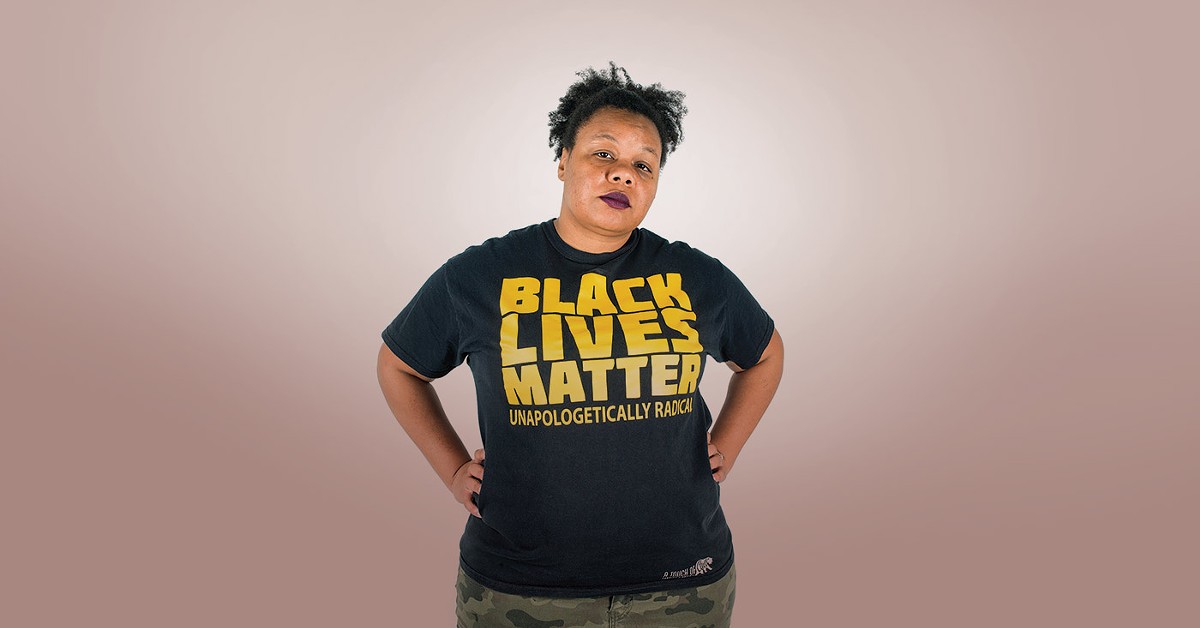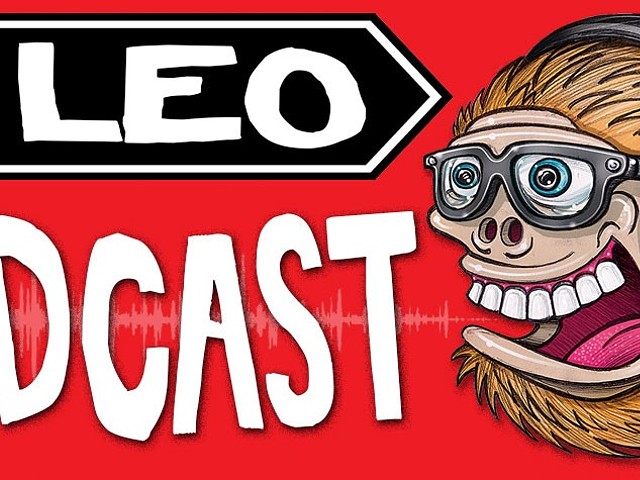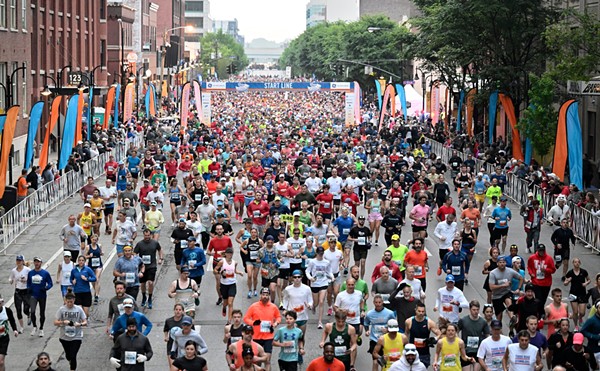Below, read how LEO's most controversial story, "White People ... ," still is widely popular 18 months later, how it affected author Chanelle Helm, what Snopes.com said about it and how a local group is working on reparations for African-Americans.
831,028.
That is how many people read “White people, here are 10 requests from a Black Lives Matter leader”on leoweekly.com since LEO published it Aug. 16, 2017.
That is by far the largest number of readers on any single story of LEO’s ever. The story by Black Lives Matter Louisville cofounder and core organizer Chanelle Helm has generated more comments than any other story (2,326 so far). Even today, it often ranks at the top of the list of weekly web page views. Most readers were from Chicago, Atlanta and New York, in that order, with Louisville close behind. Canada, the United Kingdom and Russia were the top three, after the U.S.
What began as part of a package of local stories and columns after the Charlottesville, Virginia protests ended up generating so much controversy that Snopes.com (see page 11) and other publications, among them, the Courier Journal, wrote about it. Russia-funded TV network RT conducted a truly bizarre interview with Helm. Breitbart.com picked up her piece. Tucker Carlson’s virulently conservative Daily Caller alone accounts for 25,000 views.
Some of these sites and others bent on mischief mischaracterized the piece for “maximum outrage,” as Snopes.com said. Breitbart’s headline, for example: “Black Lives Matter Activist Unveils List of Demands to White People: ‘Give Up the Home You Own’”
Helm said she had written the piece not as satire to drive home her message, as some including LEO suspected initially, but rather to connect institutional racism with what had happened in Charlottesville. It was meant to engage white people who wanted to help bring black people out of generational poverty. It was never meant as a list of “demands,” but as requests for white people who could help.
Remember, the story ran before the Cambridge Analytica reveal and just as evidence was surfacing that Facebook and social media had been a tool of Russians to manipulate the 2016 presidential election by sowing discord online.
It has been 18 months since the piece ran, so we thought it might be a good time to hear from Helm about whether the story and ensuing publicity helped or hurt her cause, and how it has changed her life.
On whether Black Lives Matter Louisville received property or donations in the wake of Helm’s list: Chanelle Helm: “People did see money and see some highlights from that, and of course we did, and I think that that was the most important part. I think the money speaks a different type of value. People may not have the time to come out and do some of the things we do, so they definitely donate. People also want to use their money and put it where their mouth should be. ...
“... As far as property, we haven’t got any donations from white people. We have got donations from black people, though. ... What we do know is several white people have reached out to us and are working with their financial advisors and their accountants, etc. And even groups of white people in different places across the nation — across the world, actually. I had a lot of people hit me up and trying to figure out what it does look like to will their property to somebody black, but then also to just move financials around so that they can get reparations.”
On how much BLM has been given: “We’ve received about $50,000. Of course, $12,000 of that went to maintaining our BLM house [Black Lives Matter Louisville’s headquarters]. We still rent it, and we were hoping to get it, but that’s — it’s moving in a different direction than what we thought it was, which is typical for West Louisville and houses. People like to push things into foreclosure and then forget that they have people living in them, and this makes people homeless, which is why we’re giving houses to black mammas.”
On those homes for black mothers: “We’ve identified six different spaces for the houses. Of course, one to give away, one to sell, communal space, group homes for youth and emergency housing for mammas, and then people have just been coming to us with different ways that we can sell the houses. ... I think what people don’t understand is that people without, once they get, it isn’t like this notion around a capitalist view of freebies. Freebies don’t actually exist. People have to work for a lot of those things, and if people actually got things free, then they could understand, like, the political power behind it, especially houses. So, to obtain property, gives you a whole different type of voice than somebody whose trying to rent property, or just trying to skate by and get by.”
On why Helm asked for property in her list: “Wherever white people can sit up and own a whole bunch of land, they think that’s power. So, if it’s power for them, then it’s going to have to be power for us at this point. ...
On whether Helm has seen progress nationally with the generational poverty of black and brown people: “Oh, absolutely not, because we still have this president in office. ... I was watching the news today, and people are selling their items to pay their bills. Stop paying your bills. The bills are run by companies, not the government. ...and if we can’t understand where our money came from and where our money goes, then we’re always going to be underneath somebody else’s power and not our own.”
On what could change this: “When people been hitting me up about what they can do, I think it’s having those real conversations of learning how to be decolonized and understanding what they can essentially do with the power that they can create. It’s going to take a long time for America to get there. I mean, we getting ready to have the Women’s March tomorrow. We about to see white womens all in their little, pink pussy hats and shit, but they the main people that be at work getting people fired. They the main people who are making sure that black and brown mommas ain’t getting the food and necessary treatments that they need at the same gynecologist they go to, watching black women die. And, so, it bewilders me that we can sit here and wait for one day to have a march when they are kidnapping kids right out of our arms day in and day out and people do not care.
“So, when people are having these conversations, they breaking down a lot. They breaking down their own internal racism. They also breaking down their own internal fascism and xenophobia. ‘Cus you got to be like, ‘Oh,’ you know, ‘my people is the best. My people is OK. I’m going to be straight. I’m going to only take care of my family at the expense of somebody else’s family.’ And that’s not how any of this works.
“And, so, I’m lucky that a lot of my white organizer friends report back to me about what they can do. I’m glad that they joined Reparations Roundtable [see page 12]. My assistant is actually over Reparations Roundtable. I’m glad that I’m able to link up and be recognized by other people in other countries about what we getting ready to do, because I don’t back down from my word, and I get shit done. So, people want to make sure, that they’re doing things right. There isn’t a right way. We’re going to have to fail a couple of times before we go ahead and get what we need. ...
“... We really have to look at how things are systemic, how things are redlined and how things are legislative. We can wait around all day for legislation, but they’re going to do exactly what they’re doing, playing chess and making sure they put their own people in those places.”
On what Helm hoped the list would do: “I was really just hoping that people would be like, really sick with it, really have some hard-core discussions. That’s exactly happened. Were people going to get organized around it? I was hoping so, and I think people are, but there’s only a few of us that actually take shit and run with it and actually build movements from it. ...”
“... I guess I wanted it to go viral, and it did. What I did not expect was the right-wingers to take it and then move my words into the way that they want to.”
On the conservative reaction to the list: “A few of them got it right. Like, some of those articles I didn’t even see what was wrong with it. Breitbart was one of them. I was just like, ‘Oh, OK, so yaw actually know what the hell I’m talking about. So yaw know. And so I think like when we look at what the right-wingers were actually talking about in their interpretation of my words, we can actually see that fascism is real.
“I mean, I don’t know what it’s going to take for people to wake up, but we can actually see that they know what they’re doing. They know they keeping black people out of they homes. They know that they own some of these homes that they’re charging us for rent for. They know that they’re making sure that these homes are not sustainable. They know that people are dying because of the shit that’s in their homes. They know that the water is fucked up out here in Flint and Louisiana and South Carolina and Mississippi. And they know these things, and they’re doing them on purpose, and we just sitting back talking about when’s the next time that we going to go to work. For who? For the other white man? ...
“... And the people who always get offended, always get offended, are poor white people sitting in situational poverty. … What I’m upset about is black people been sitting like this for generations. Yaw essentially making a dollar off of black people being poor, and yaw OK with that.”
On death threats Helm received: “Facebook loves to protect white men, and, so we had said a few things about white people, certain countries, and I had got blocked off Facebook for a week. And so I couldn’t really see all of them, you know, messages tied to that. They took my email, sending a lot of things to my email. There was a few that came there. There was a lot more people trying to explain to me how white people are poor, too, which I don’t give a fuck about.
“And, the ones that I could see come through my messenger kind of scared me, because of their proximity to where I actually live at, like Indiana. Some of the rest were from Kentucky, Tennessee, that type of shit. So, I didn’t know if they were actually planning to actually come. I got cybersecurity on that first just to make sure we locked down a lot of the accounts, and then I got, like, physical security locked in on that, too. And then still working on ways that we could have formidable community safety, instead of relying on the police, ‘cause I damn sure don’t want to call them in case some shit happens. But I was more worried about my family then I was myself. ...
“... If somebody comes and kills them or whatever or somebody takes them out or somebody kidnaps my children, that’s something that I worry about. And I had a lot of people address those things. I guess thinking that that would get to me, too. So, a lot of this is psychological. I can get scared. I can fear something all day, but I don’t fear people, and so if people going to do something, they’d’ve already done it, and they haven’t done it, so it was all fluff.”
On Helm’s interview on RT, a Russia-funded TV network: “That was really weird for us, because we negotiated that entire thing. I had just got back from Boston. I’m talking about literally just got off the plane. And then they wanted to do this interview so bad, talking about how it was so timely. And I was like, I guess so. …
“ … And when they pitted me up against the person, because I had not really seen anything really, really bad from RT. I had seen a few things that spoke in the right light, so I was like, fine, and I was like, I’m not arguing with anybody. That’s what I’m not getting ready to do ‘cause I don’t feel like I need to debate my humanity.
“And when he got up there, he was a gay, right-wing comedian. And I was just like, [Helm stares blankly] so that’s why most of that is edited, because I just did not say anything. He wasn’t talking about shit. He was just saying popular views, and I was just like, I really shouldn’t even have done this. I really should not have. But I’m here. Let me make sure I go over the points that I’ve only had to come up with in the last few seconds about how dangerous Trump and Jeff Sessions are, and what they’re actually doing, and what we’re actually seeing is seeing our law enforcement allow people to commit crime against black and brown people.”
On whether it added to the conversation: “Yeah, it did, because even that piece went viral, and I was glad that people saw that, and I think people did need that, because a lot of people did like that. There was a lot of people and even black people that still don’t understand, like, why do we need their houses? Not understanding what the land does and the type of power that holds. But yeah, I know at least my brothers were happy. And these are people who have been targeted by the police, so I was fine with that.”
On why black people deserve reparations: “I think when we discuss what race relations are and how things got to where they are, it’s easy for white folks to ignore all the different things that are systemically racist right now — fascism, xenophobia, transphobia and all of those things — because, as long as you can go out here and make a living, then it doesn’t bother you. But that living is made off the backs of, like, several different types of people[’s] genocide, particularly, those that come from the [trans-] Atlantic slave trade.
“And, so, when we talk about black people having reparations: One, we mean it, and two, we’re talking about working the land forcibly. We’re talking about enduring different types of genocidal traits and then existing in a world that still wants to see your demise. We’re looking at high incarceration rates. Our criminal justice system is funded fully off of black and brown people bodies and other white supremacist tactics. We’re looking at white men still in power in different places, and if they’re not white, then their voice is not legitimized. You see that with women who are in political spaces. Attica Scott ... has been in the Kentucky state [House], and we just don’t even care about that. ...
“... I think when we think about reparations, we think that it has to happen through legislation in the government. But the government didn’t initiate slavery. Slavery was a tactic that was initiated by company owners. So, when we are talking about reparations, we are definitely talking about companies, but we’re also talking about individual white people.”
On the reaction Helm received from the left: “You know who was really mad was the liberals. The little white people that get out there with us. They was upset. And I heard all types of people, because I wasn’t on Facebook ... was so upset when that list came out, and I was just like, ‘Oh, hey, Mary,’ who wants to come and bring us like tea and crumpets for an action or some shit. Are you going to bring a poster? Yeah, I’m talking about you. ‘Cause you sit in these meetings with us, day in and day out. We getting ready to go to some meetings today. We’re getting ready to have some meetings on Sunday and we have a meeting that’s getting ready to come up next weekend. We have all these meetings, and we know what the root problem is, and they just sit there. They just sit there. You literally have to travel into The West End to come to these meetings, and you literally have to travel your white ass over to The East End in your safe neighborhood. You know what I’m saying?
“So, it’s frustrating, and like — it’s not frustrating. I am totally pissed off that, like, liberals, and that’s what I’ll call them, think it’s OK to do marches with us, show up, ask for our energy and our emotional time and shit and then not do any of this hard work with us that we set the marches up for. Like, I’m not getting out there cussing out the police ‘cause it’s fun, and I want to wear a shirt. I’m cussing out the police, because I’m tired of seeing the police. Just last night, I don’t even know how many stops I saw.”
On whether Helm would write her list again: “Yes. Had I been born, like, during enslavement, I’d be dead. Had I been born during Reconstruction, I’d be dead. Jim Crow? I’d be dead. Civil Rights Movement? I probably would be dead. It just depends. ... I mean I’ve said way worse shit than the list.”
On what Helm would add to the list: “Let’s definitely put, ‘Get off yaws’ asses.’ You can put that one on there. Shut a company down, one that we know utilizes slave labor. Shut down a piece of government that we do not need. There are pieces to the criminal justice system that we absolutely just do not need. One is youth detention. If we think it is OK to lock our children up than to actually utilize those funds to feed them and house them ... you are not rehabilitating any-fucking-body, and we know jail is not doing that. ... I also would love, love for white people to say the things they want to say, regardless of repercussions, because regardless of what I say or everybody else says, Imma get that heat. Yaw going to have to take some of this heat, too. I’m tired.” •






